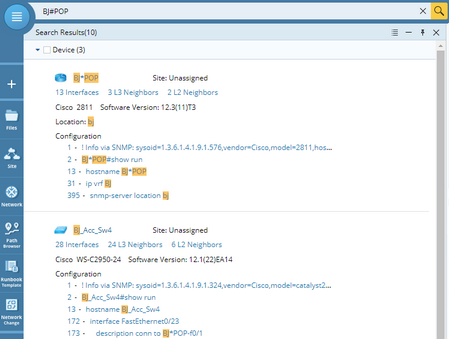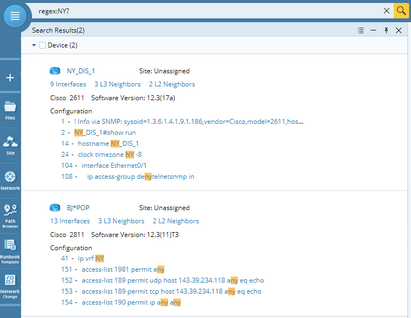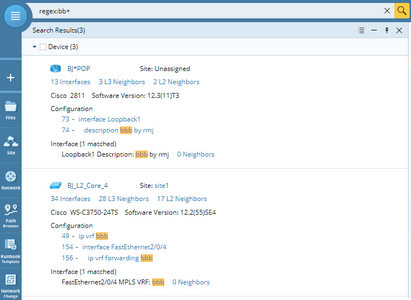Search Patterns
The following search patterns are supported:
Tip: The keywords used in the search are case-insensitive. For example, entering ospf, osPF or OSPF will return the same results.
Full-Text Search
Use full text enclosed with double quotes (" ") to search for an exact phrase.
Tip: The double quotes can be omitted if you want to use an IP address for an exact search.
Example: Search for the device BJ-R1.

Term Search
Split full text into terms with separators and find objects containing any of the terms.
▪The following characters are treated as separators:
! " # $ % & ' ( ) + , ; < = > @ [ \\ ] ^ ` { | } ~
Note: The * and ? characters are used as wildcards. Only in Advanced Search, they are used as separators.
For example, when you enter BJ#POP as the keyword, it will be split into two terms: BJ and POP. The name of the objects containing either BJ or POP is listed in the search results, with the matched term highlighted.

▪The following characters are not treated as separators:
_ - . / :
For example, when you enter BJ_POP as the keyword, it will not be split into two terms. Only the name of the object exactly matches BJ_POP is listed in the search results.

Wildcard Search
Wildcard is a character that can be used as a substitute for any of a class of characters in a search, thereby greatly increasing the flexibility and efficiency of searches.
The system supports both single and multiple character wildcard searches as follows.
Wildcard |
Description |
Example |
* |
A multi-character wildcard search, which is used to look for zero or more characters replaced. For example, to search for test, tests or tester, you can use the search: test*. You can also use the wildcard in the middle of a term, like te*t. |
|
? |
A single character wildcard search, which is used to look for terms that match with the single character replaced. For example, to search for text or test, you can use the term: te?t. |
Note: It may take a while to return the search results if the search text starts with any wildcard because all terms in the index will be examined.
Semantic Search
Use semantic terms to query highly relevant information rather than sorting through a list of loosely related keyword results.
The following semantic terms are supported in semantic search.
Semantic Term |
Search Result |
|---|---|
Returns devices of which interfaces are configured with the specified VRF name. |
|
Returns devices of which interfaces are configured with the specific OSPF area ID. |
|
Returns devices configured with the specified hostname. |
|
Returns sites configured with the specified name. |
Regex Search
Regular expression (regex for short) is a pattern that denotes a class of alternative strings to match. Regex search supports keywords conducted with a regular expression for a fuzzy search. To make the regex search recognized, you must add the regex: prefix before the regular expression.
The following characters are allowed in regex search.
Character |
Description |
Example |
Match any character |
||
. |
Used to represent any characters. |
|
Zero-or-one |
||
? |
Used to make the preceding shortest pattern optional. It matches zero or one time. |
|
One-or-more |
||
+ |
Used to repeat the preceding shortest pattern once or more times. |
|
Zero-or-more |
||
* |
Used to match the preceding shortest pattern zero-or-more times. |
|
Alternation |
||
| |
Used as an OR operator. It matches the pattern on either the left side or the right side. |
|
Min-to-max |
||
{} |
Used to specify a minimum and a maximum (optionally) number of times that the preceding shortest pattern can repeat. |
|
Character classes |
||
[ ] |
Used to enclose ranges of potential characters as character classes. Note: The dash character (-) indicates a range of characters, unless it is the first character. |
|
Grouping |
||
( ) |
Used to group all characters listed above to form sub-patterns. |
|










